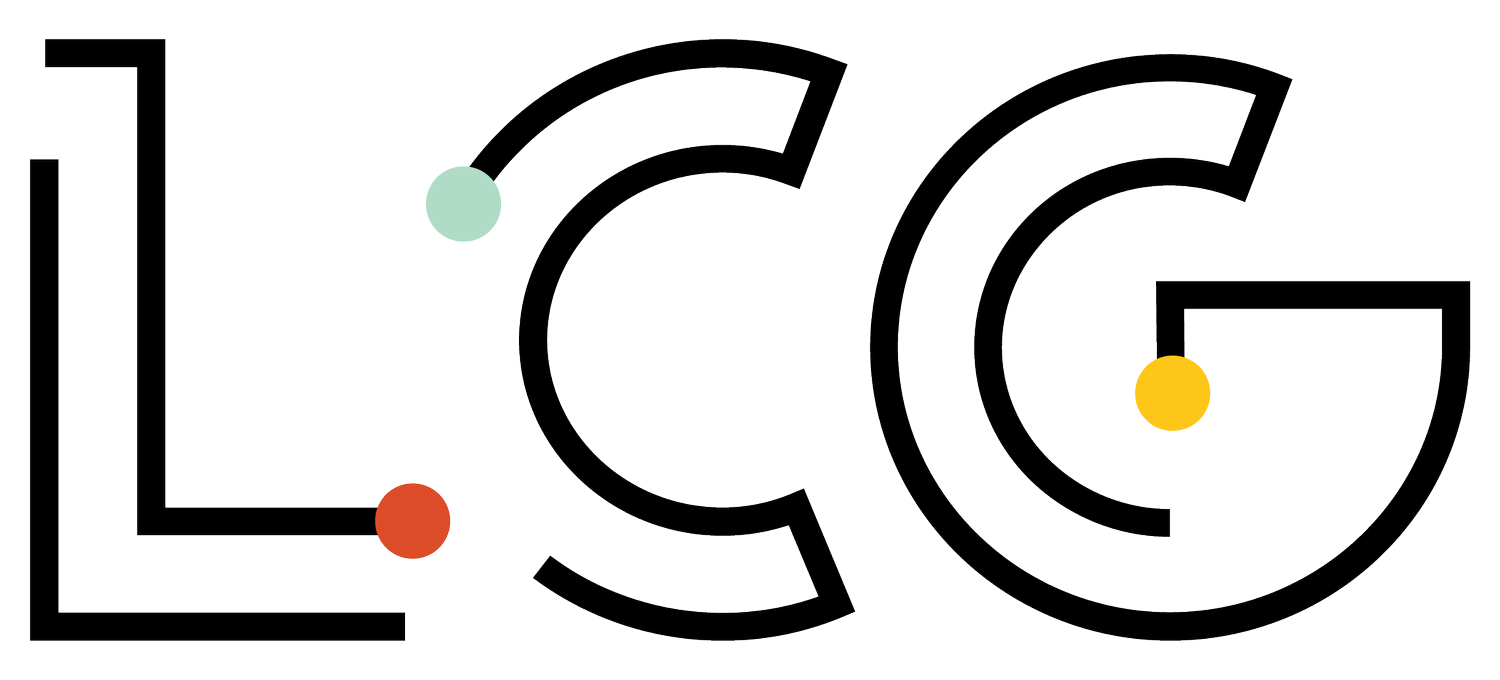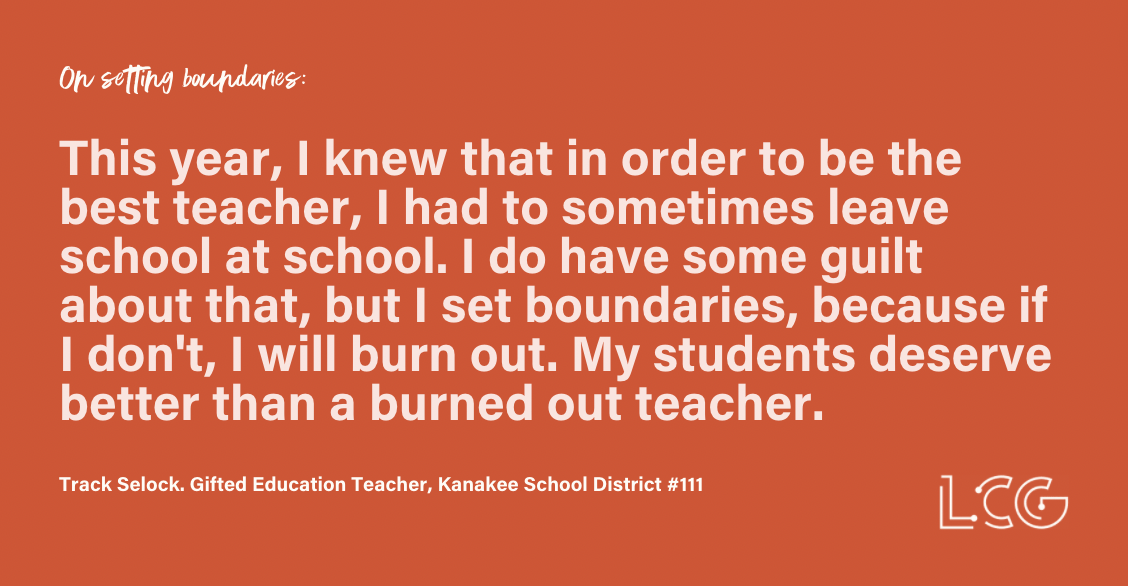In this episode of All Things Marketing and Education, we sat down with Tracy Selock, who teaches gifted and talented fifth- and sixth-graders in Kankakee, IL, and is an adjunct professor at Olivet Nazarene University, and a founder of the Nourished Teachers Facebook community. Elana Leoni, CEO at Leoni Consulting Group (LCG), chatted with Tracy about what it’s like to teach in the pandemic's third year, what teachers need most from the EdTech industry, and the critical importance of self-care. We'd love for you to listen to the entire podcast episode, but we’ve also highlighted our favorite points below. Make sure to also scroll to the bottom to access the resources that Tracy mentioned.
Educators Are Facing High Demands with Little Resources
Despite it being the third year of the pandemic, things have remained challenging and in many cases, this year is the most challenging year yet for educators. These are not easy times for teaching. As Tracy described it, "A lot of kids are socially-emotionally delayed almost two years. It doesn't just go from not having social interaction. Some kids didn't have rules, procedures, and boundaries with time for almost two years. So when it's time for that grace and flexibility to be reined in, there's a lot of pushback."
Schools are facing employee shortages, from counselors to bus drivers, and educators are expected to continue their interventions and home contacts even with many students back in the classroom. Despite all this, Tracy pointed out an upside:
"The pandemic propelled so many educators forward in their use of technology. You had no choice but to figure it out. None of that PD, of course, was credited to us, but it has improved our teaching because a lot of those pieces of technology were best practices for our learners."
How EdTech Can Still Support Educators During a Pandemic
The EdTech industry has helped education through two years of remote and hybrid learning; now that landscape is changing. Many EdTech companies can no longer provide their services or products for free. District policies and small budgets limit the products that many educators can use. Tracy offered the EdTech industry this advice on behalf of educators:
"There's pressure from companies: 'If you want to continue to use this, make sure your administrator or your person who does the purchasing calls us.' That's stressful because, trust me, if I used the product and loved it, I've already told the person who's in charge of purchasing. Teachers don't have a lot of sway on what technology gets purchased. I have a $100-per-year budget for 28 children."
She added, "We have legislation in Illinois that if companies won't sign the agreement that says they will not distribute, sell, or use student data gathered, we're not allowed to use the product at all. We can't even pilot or beta test anything for an EdTech company without those agreements. We're not allowed to use any product that has a Google login if they haven't signed the agreement. So that also creates a situation of, 'I really love your product, but I can't use you until it runs through my approval committee.'"
Setting Boundaries to Combat Educator Burnout
Throughout the pandemic, the social and emotional wellbeing of students has been at the forefront of conversations but for the most part, educators have been left out of that conversation despite the fact that educators are the most important factor in a student’s success. Tracy has learned to advocate for teacher wellbeing. She noted that in a predominantly female profession, there are built-in expectations of self-sacrifice with a flipside of guilt around not doing enough. She explained why that thinking isn't sustainable:
"I ran myself into the ground in 2020, not even being able to stand up properly because of the way I was sitting for hours on a screen day after day. Whenever my children needed me, I was there. This year, I knew that in order to be the best teacher and a nourished human being, I had to sometimes leave school at school. I do have some guilt about that, but I set boundaries, because if I don't, I will burn out. My students deserve better than a burned out teacher."
A self-confessed people pleaser, Tracy revealed surprising power of "no":
"You don't have to give a reason. I don't want to be on that committee. I don't want to be in that meeting. Obviously I'm not telling you to shirk your contractual obligations. I'm saying we need a volunteer to be, 'The answer is no, because my time is my time, and I've done more than my job, and right now I'm prioritizing my health and wellness, so the answer is no.'"
Tracy promised, "No matter what state, what size district or school, what grade level, you're not alone. We're here. Lean on each other. Have each other's back. Reach out, be honest with yourself, and it's OK to say no. Just keep at it. No matter how you feel about the job you're doing right now, you're doing the best job you can, and that's OK."
Here's the full transcript of Tracy's podcast episode.
Resources Mentioned in this Episode:
Nourished Teachers (a community co-created by teachers focused on nourishing the minds, bodies, and spirits of K-12 classroom teachers in the U.S., Tracy is a founding member)
Discovery Education Network (DEN) (an educators' community that Tracy is a part of)
SMART Exemplary Educators (a global group of educators who believe in inspiring greatness in students and colleagues, which Tracy is a part of)
Is Teaching Undervalued Because It’s “Women’s Work”? (some reading Tracy finds fascinating.)
Inequities Exposed During the Pandemic: A Conversation with Sarah Thomas (another podcast episode about teaching and education during the pandemic)
Get in touch with Tracy via email
Episode Skeleton (use this to jump to the parts you want to listen to):
[00:30] a little bit about Tracy
[10:40] The impact of teachers on Tracy and Elana
[14:51] What is it really like being an educator during the pandemic?
[15:28] Where the kids are today.
[16:45] Shifting back to synchronous work
[18:01] Attendance is awful
[19:57] What is it like being an educator more personally?
[23:23] What people who don’t teach don’t realize
[29:29] The guilt of not doing extra and pressure to overperform
[31:23] Establishing boundaries and prioritizing wellness
[35:07] The hardest part of teaching is you can never do enough
[35:25] Learning to say no. [video clip]
[37:07] Ask for the things you need.
[39:32] Tracy’s classroom looks like an apartment
[41:25] What Tracy wishes EdTech folks knew
[47:02] Tracy’s advice for educators right now
[49:11] What gets Tracy inspired these days
Elana Leoni, Host
Elana Leoni has dedicated the majority of her career to improving K-12 education. Prior to founding LCG, she spent eight years leading the marketing and community strategy for the George Lucas Educational Foundation where she grew Edutopia’s social media presence exponentially to reach over 20 million education change-makers every month.
Tracy Selock, Guest
A classroom teacher with 26 years of experience, Tracy has spent 21 of those years educating a fifth/sixth-grade class of gifted and talented students at Kankakee School District 111. She earned her teaching degree at Illinois State University in 1994. She also holds two master's degrees, the first in teaching and learning from the University of St. Francis, and the second in instructional technology from Nova Southeastern University. She's served as an adjunct professor, teaching in the master's program at Olivet Nazarene University for 12 years. She recently joined the EdMod team at Meta, focusing on teacher wellness. Tracy has been married for 25 years, has two sons, and lives on her family farm where she spends as much time as possible working with her dad.
About All Things Marketing and Education
What if marketing was judged solely by the level of value it brings to its audience? Welcome to All Things Marketing and Education, a podcast that lives at the intersection of marketing and you guessed it, education. Each week, Elana Leoni, CEO of Leoni Consulting Group, highlights innovative social media marketing, community-building, and content marketing strategies that can significantly increase brand awareness, engagement, and revenue.
Rate, Like, and Subscribe
Let us know what you thought about this episode by rating and reviewing our podcast. Click here, scroll to the bottom, tap to rate with five stars, and select “Write a Review.” Then be sure to let us know what you loved most about the episode! Also, if you haven’t done so already, subscribe to the podcast to be notified when we have more content to share with you.





